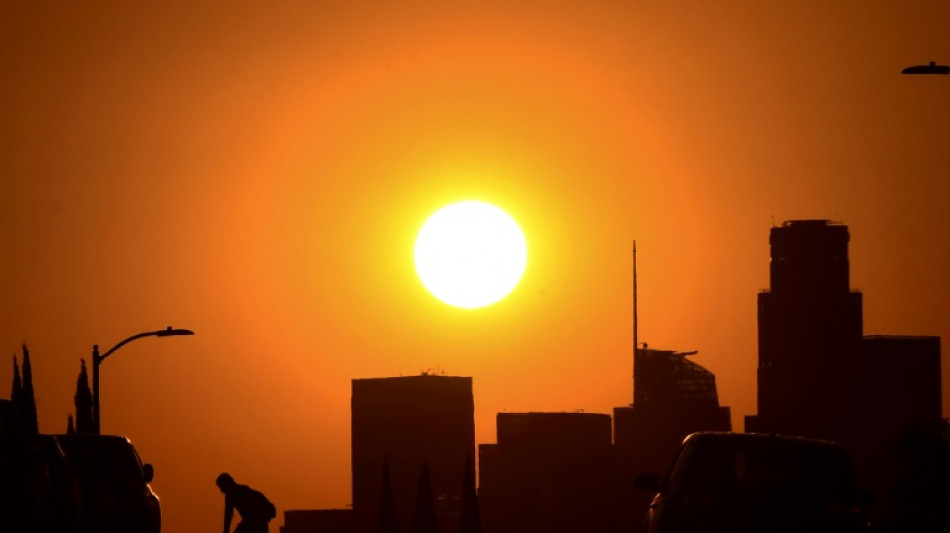
-
 US freestyle skier Ferreira wins Olympic halfpipe gold
US freestyle skier Ferreira wins Olympic halfpipe gold
-
Svitolina edges Gauff to set up Pegula final in Dubai

-
 'Proud' Alcaraz digs deep to topple Rublev and reach Qatar final
'Proud' Alcaraz digs deep to topple Rublev and reach Qatar final
-
UK govt considers removing ex-prince Andrew from line of succession

-
 New study probes why chronic pain lasts longer in women
New study probes why chronic pain lasts longer in women
-
Trump vows 10% global tariff after stinging court rebuke

-
 Aston Martin in disarray as Leclerc tops F1 testing timesheets
Aston Martin in disarray as Leclerc tops F1 testing timesheets
-
Venus Williams accepts Indian Wells wild card

-
 Anxious Venezuelans seek clarity on new amnesty law
Anxious Venezuelans seek clarity on new amnesty law
-
Last-gasp Canada edge Finland to reach Olympic men's ice hockey final

-
 Scotland captain Tuipulotu grateful for Wales boss Tandy's influence
Scotland captain Tuipulotu grateful for Wales boss Tandy's influence
-
Zelensky says no 'family day' in rare personal interview to AFP

-
 Zelensky tells AFP that Ukraine is not losing the war
Zelensky tells AFP that Ukraine is not losing the war
-
Sweden to play Switzerland in Olympic women's curling final

-
 Counting the cost: Minnesota reels after anti-migrant 'occupation'
Counting the cost: Minnesota reels after anti-migrant 'occupation'
-
UK police probe Andrew's protection as royals reel from ex-prince's arrest

-
 Doris says Ireland must pile pressure on England rising star Pollock
Doris says Ireland must pile pressure on England rising star Pollock
-
US military assets in the Middle East

-
 Neymar hints at possible retirement after World Cup
Neymar hints at possible retirement after World Cup
-
Stocks rise after court ruling against US tariffs

-
 Australia end dismal T20 World Cup by thrashing Oman
Australia end dismal T20 World Cup by thrashing Oman
-
Olympics chief says Milan-Cortina has set new path for Games

-
 Russian SVR spy agency took over Wagner 'influence' ops in Africa: report
Russian SVR spy agency took over Wagner 'influence' ops in Africa: report
-
Pegula fights back to sink Anisimova and reach Dubai final

-
 Trump administration denounces 'terrorism' in France after activist's killing
Trump administration denounces 'terrorism' in France after activist's killing
-
Colombia's Medellin builds mega-prison inspired by El Salvador's CECOT

-
 German broadcaster recalls correspondent over AI-generated images
German broadcaster recalls correspondent over AI-generated images
-
US Supreme Court strikes down swath of Trump global tariffs

-
 England's Itoje says managing 'emotional turmoil' key to 100 cap landmark
England's Itoje says managing 'emotional turmoil' key to 100 cap landmark
-
Trump says weighing strike on Iran as Tehran says draft deal coming soon

-
 Tudor is '100 percent' certain of saving Spurs from relegation
Tudor is '100 percent' certain of saving Spurs from relegation
-
Azam dropped for scoring too slowly, says Pakistan coach Hesson

-
 Stocks volatile after soft US growth data, court ruling against tariffs
Stocks volatile after soft US growth data, court ruling against tariffs
-
Italy bring back Capuozzo for France Six Nations trip

-
 From Malinin's collapse to Liu's triumph: Top Olympic figure skating moments
From Malinin's collapse to Liu's triumph: Top Olympic figure skating moments
-
Arteta urges Arsenal to 'write own destiny' after title wobble

-
 Ukraine Paralympics team to boycott opening ceremony over Russian flag decision
Ukraine Paralympics team to boycott opening ceremony over Russian flag decision
-
Wales captain Lake wants fans to bring 'noise' against Scotland

-
 Skier Vonn's Italian hospital a hotbed of men, sister says
Skier Vonn's Italian hospital a hotbed of men, sister says
-
India target S.Africa top order, Abhishek to come good: bowling coach

-
 Carrick praises Man Utd 'diversity' after Ratcliffe's immigrant rant
Carrick praises Man Utd 'diversity' after Ratcliffe's immigrant rant
-
I never thought it would be hit, says 'Scream' creator 30 years later

-
 AI summit statement delayed to 'maximise' signatories: India
AI summit statement delayed to 'maximise' signatories: India
-
Barcelona's Sagrada Familia basilica hits peak height

-
 Milan sprints to second straight UAE stage win as Tiberi keeps lead
Milan sprints to second straight UAE stage win as Tiberi keeps lead
-
US GDP growth misses expectations as Trump blames shutdown

-
 Benfica investigate video of fans' monkey gestures
Benfica investigate video of fans' monkey gestures
-
French minister pledges tight security at rally for killed activist

-
 Guardiola 'couldn't care less' about Arsenal stumble in title race
Guardiola 'couldn't care less' about Arsenal stumble in title race
-
UK police search property as royals reel from Andrew's arrest


Climate: Could moon dust keep Earth cool?
Whether out-of-the-box thinking or a sign of desperation, scientists on Wednesday proposed the regular transport of moon dust to a gravity point between Earth and Sun to temper the ravages of global warming.
Ideas for filtering solar radiation to keep Earth from overheating have been kicking around for decades, ranging from giant space-based screens to churning out reflective white clouds.
But the persistent failure to draw down planet-warming greenhouse gas emissions has pushed once-fanciful geoengineering schemes toward centre stage in climate policy, investment and research.
Blocking one to two percent of the Sun's rays is all it would take to lower Earth's surface by a degree or two Celsius -- roughly the amount it has warmed over the last century.
The solar radiation technique with the most traction so far is the 24/7 injection of billions of shiny sulphur particles into the upper atmosphere.
So-called stratospheric aerosol injection would be cheap, and scientists know it works because major volcanic eruptions basically do the same thing. When Mount Pinatubo in the Philippines blew its top in 1991, it lowered temperatures in the northern hemisphere by about 0.5C for nearly a year.
But there are serious potential side-effects, including the disruption of rain patterns upon which millions depend for growing food.
However, a new study in the peer-reviewed journal PLOS Climate explores the possibility of using moon dust as a solar shield.
A team of astronomers applied methods used to track planet formation around distant stars -- a messy process that kicks up vast quantities of space dust -- to Earth's moon.
Computer simulations showed that putting lunar dust at a gravitational sweet spot between Earth and Sun "blocked out a lot of sunlight with a little amount of mass", said lead author Ben Bromley, a professor of physics at the University of Utah.
- 'Balancing marbles' -
The scientists tested several scenarios involving different particle properties and quantities in different orbits, looking for the one that would throw the most shade.
Moon dust worked best. The quantities needed, they said, would require the equivalent of a major mining operation on Earth.
The authors stressed that their study was designed to calculate potential impact, not logistical feasibility.
"We aren't experts in climate change or rocket science," said co-author Benjamin Bromley, a professor at the Harvard-Smithsonian Center for Astrophysics.
"We were just exploring different kinds of dust on a variety of orbits to see how effective this approach might be," he added. "We don't want to miss a game changer for such a critical problem."
Experts not involved in the study praised its methodology but doubted whether it would actually work.
"Placing moon dust at the gravity mid-point between Earth and Sun, can indeed reflect heat," said University of Edinburgh professor Stuart Haszeldine.
"But this is like trying to balance marbles on a football -- within a week most dust has spun out of stable orbit."
For Joanna Haigh, an emeritus professor of atmospherics at Imperial College London, the study is a distraction.
The main problem, she said, "is the suggestion that the implementation of such schemes will solve the climate crisis whereas it just gives polluters an excuse not to act."
S.Gregor--AMWN



